| Listing 1 - 10 of 30 | << page >> |
Sort by
|
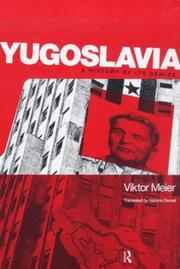
ISBN: 1134665113 129928504X 1280142936 0203981863 9780203981863 0415185955 9780415185950 9780415185967 0415185963 9786610142934 6610142939 0415185963 9781134665112 9781299285040 9781280142932 9781134665068 9781134665105 1134665105 Year: 1999 Publisher: London New York Routledge
Abstract | Keywords | Export | Availability | Bookmark
 Loading...
Loading...Choose an application
- Reference Manager
- EndNote
- RefWorks (Direct export to RefWorks)
Victor Meier presents a history of the disintegration and collapse of the former Yugoslavia, drawing on federal and republican archives, and sources which are not yet officially open for scholarly use.
Yugoslav War, 1991-1995 --- Causes. --- Yugoslavia --- Former Yugoslav republics. --- Ex-Yugoslav republics --- Ex-Yugoslavia --- Former Yugoslavia --- History
Book
ISBN: 9053527435 Year: 2002 Publisher: Amsterdam : Boom,
Abstract | Keywords | Export | Availability | Bookmark
 Loading...
Loading...Choose an application
- Reference Manager
- EndNote
- RefWorks (Direct export to RefWorks)
316.647.8 <497> --- Beeldvorming. Etikettering. Sociaal stigma. Stereotype vooroordeel--Balkanstaten --- 316.647.8 <497> Beeldvorming. Etikettering. Sociaal stigma. Stereotype vooroordeel--Balkanstaten --- Former Yugoslav republics --- Yugoslavia --- Ex-Yugoslav republics --- Ex-Yugoslavia --- Former Yugoslavia --- History.
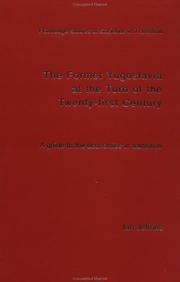
ISBN: 0429229798 0203216954 1280104112 1134460503 9780203216958 9781134460496 113446049X 0415281903 9780415281904 9781134460502 9781134460458 Year: 2003 Publisher: London New York Routledge
Abstract | Keywords | Export | Availability | Bookmark
 Loading...
Loading...Choose an application
- Reference Manager
- EndNote
- RefWorks (Direct export to RefWorks)
This book focuses on the recent political and economic events in the former Yugoslavia.The author presents a clear, detailed and accessible breakdown of the developments in: Bosnia-Hercegovina, Croatia, the Former Yugoslav Republic of Macedonia, Slovenia and the Federal Republic of Yugoslavia (Serbia and Montenegro). The role of the West in the more unstable countries of the Former Yugoslavia has been reassessed in the light of the terrorist attacks on the United States and the fall of Afghanistan. The involvement of the US, in particular, in countries affected by ethnic strife has bee
Political science. --- Administration --- Civil government --- Commonwealth, The --- Government --- Political theory --- Political thought --- Politics --- Science, Political --- Social sciences --- State, The --- Former Yugoslav republics --- Ex-Yugoslav republics --- Ex-Yugoslavia --- Former Yugoslavia --- Economic conditions. --- Politics and government.
Book
ISBN: 1474221521 147422153X 1350007633 9781474221535 9781474221542 1474221548 9781474221559 1474221556 9781350007635 9781474221528 Year: 2015 Publisher: London New York
Abstract | Keywords | Export | Availability | Bookmark
 Loading...
Loading...Choose an application
- Reference Manager
- EndNote
- RefWorks (Direct export to RefWorks)
Between 1914 and the present day the political makeup of the Balkans has relentlessly changed, following unpredictable shifts of international and internal borders. Between and across these borders various political communities were formed, co-existed and (dis)integrated. By analysing one hundred years of modern citizenship in Yugoslavia and post-Yugoslav states, Igor Štiks shows that the concept and practice of citizenship is necessary to understand how political communities are made, un-made and re-made. He argues that modern citizenship is a tool that can be used for different and opposing goals, from integration and re-unification to fragmentation and ethnic engineering. The study of citizenship in the ‘laboratory’ of the Balkands offers not only an original angle to narrate an alternative political history, but also an insight into the fine mechanics and repeating glitches of modern politics, applicable to multinational states in the European Union and beyond.
Citizenship --- Yugoslavia --- Former Yugoslav republics --- Politics and government. --- Birthright citizenship --- Citizenship (International law) --- National citizenship --- Nationality (Citizenship) --- Political science --- Public law --- Allegiance --- Civics --- Domicile --- Political rights --- Law and legislation --- Ex-Yugoslav republics --- Ex-Yugoslavia --- Former Yugoslavia
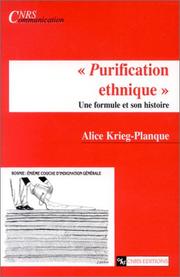
ISBN: 2271060893 2271090903 9782271060891 9782271090904 Year: 2016 Publisher: Paris : CNRS Éditions,
Abstract | Keywords | Export | Availability | Bookmark
 Loading...
Loading...Choose an application
- Reference Manager
- EndNote
- RefWorks (Direct export to RefWorks)
« Purification ethnique » : en pleine guerre yougoslave (1992), apparaît cette dénomination jusque-là inédite, aux côtés d’expressions comme « épuration ethnique » ou « nettoyer ethniquement ». Avec ce néologisme, les acteurs de l’espace public disposent d’une nouvelle catégorie pour décrire le monde et donner aux événements (yougoslaves ou non) un certain cadre. À quels discours politiques et médiatiques le conflit yougoslave a-t-il donné lieu ? De quelle manière ces discours ont-ils porté ? Pour répondre à ces questions, Alice Krieg-Planque étudie le récit de certains événements (découverte des camps, des viols…), puis analyse des slogans et des dénominations dont le rôle s’est avéré central dans la lecture du conflit : « Plus jamais ça ! », « Musulmans », « communauté internationale » et bien sûr la formule « purification ethnique », considérée comme un descripteur majeur de la guerre. L’auteur aborde aussi la place de certains textes dans la construction du discours (par exemple, le Mémorandum de 1986 attribué à l’Académie des sciences et des arts de Belgrade). L’analyse d’Alice Krieg-Planque apporte ici un éclairage original sur le conflit yougoslave, en montrant notamment, grâce à des méthodes applicables à d’autres corpus, comment les discours participent à l’histoire du conflit lui-même. Bien au-delà des sciences du langage, ce livre intéresse donc également la science politique, l’histoire, la sociologie et la philosophie politique.
Genocide --- Nettoyage ethnique dans la presse --- Press coverage --- Yugoslav War, 1991-1995 --- Guerre dans l'ex-Yougoslavie, 1991-1995 --- Atrocities --- Atrocities. --- Yugoslavia --- Former Yugoslav republics --- Ethnic relations. --- Cleansing, Ethnic --- Ethnic cleansing --- Ethnic purification --- Ethnocide --- Purification, Ethnic --- Crime --- Ex-Yugoslav republics --- Ex-Yugoslavia --- Former Yugoslavia --- Yugoslav War, 1991-1995 - Atrocities --- Genocide - Yugoslavia --- Genocide - Former Yugoslav republics --- médias --- nettoyage ethnique --- presse --- Yougoslavie --- France --- guerre
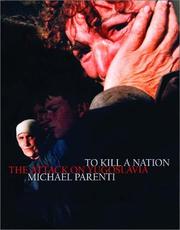
ISBN: 1859847765 1859843662 Year: 2000 Publisher: London : Verso,
Abstract | Keywords | Export | Availability | Bookmark
 Loading...
Loading...Choose an application
- Reference Manager
- EndNote
- RefWorks (Direct export to RefWorks)
#SBIB:328H271 --- Instellingen en beleid: Balkanstaten: Roemenië, Bulgarije, Ex-Joegoslavië, Albanië e.a. --- Kosovo War, 1998-1999. --- Kosovo War, 1998-1999 --- Kosovo Conflict, 1998-1999 --- Kosovo Crisis, 1998-1999 --- Instellingen en beleid: Balkanstaten: Roemenië, Bulgarije, Ex-Joegoslavië, Albanië e.a --- North Atlantic Treaty Organization --- North Atlantic treaty organisation --- NAVO --- OTAN --- Former Yugoslav republics --- Ex-Yugoslav republics --- Ex-Yugoslavia --- Former Yugoslavia --- Politics and government. --- NATO
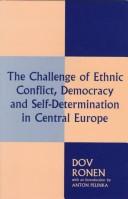
ISBN: 0714643084 0714647527 Year: 1997 Publisher: London Cass
Abstract | Keywords | Export | Availability | Bookmark
 Loading...
Loading...Choose an application
- Reference Manager
- EndNote
- RefWorks (Direct export to RefWorks)
#SBIB:328H27 --- #SBIB:324H72 --- Instellingen en beleid: Midden- en Centraal Europa: algemeen --- Politieke verandering: conflictlijnen, nationalisme/federalisme --- #SBIB:324H72Instellingen en beleid: Midden- en Centraal Europa: algemeen --- Democracy --- Europe, Central --- Post-communism --- Self-government --- Political science --- Equality --- Representative government and representation --- Republics --- Former Yugoslav republics --- Ex-Yugoslav republics --- Ex-Yugoslavia --- Former Yugoslavia --- Politics and government --- Ethnic relations.
Book
ISBN: 9781138061835 1138061832 9781315162065 1315162067 9781351667142 1351667149 9781351667159 1351667157 9781351667135 1351667130 Year: 2019 Publisher: London ; New York, NY : Routledge,
Abstract | Keywords | Export | Availability | Bookmark
 Loading...
Loading...Choose an application
- Reference Manager
- EndNote
- RefWorks (Direct export to RefWorks)
Balkanization (territorial fragmentation) is becoming a significant urban and geopolitical pursuit in contemporary times. Countries, cities and regions are ever increasingly voicing the desire for independence and balkanization from the nation or union they are a part of. This monograph generally maps the historical and theoretical emergence of balkanization, as well its more recent spread into fields as far ranging as law, medicine, data and security studies, sociology, architecture and the urban. The spatialization of balkanization is particularly addressed in terms of destruction and renewal through a detailed sociopolitical interrogation of architecture and the urban, including their changing symbolic, ideological and functional forms.The spatial connections between balkanization, violent remaking (destruction and renewal) and global politics have predominantly been analyzed via the former Yugoslav context and the Balkans, however, spotlight has also been directed to the current political climate of the UK, Australia and the Anglo-Saxon geopolitics. The analysis helps in understanding broader emergent patterns of sociospatial polarization across various scales, and in respect to global geoeconomic and geopolitical restructuring. This is particularly important because drawing connections between balkanization, economics, law, media and technology is to gain an awareness of - and engagement with - the emerging implications of spatial remaking and global politics.This monograph is a valuable resource and will be relevant to academics and students interested in spatial politics; including architecture, urbanism, geography, sociology, politics, international development, conflict, and cultural studies.
Architecture --- Architecture, Western (Western countries) --- Building design --- Buildings --- Construction --- Western architecture (Western countries) --- Art --- Building --- Political aspects --- Design and construction --- Balkan Peninsula --- Former Yugoslav republics --- Ex-Yugoslav republics --- Ex-Yugoslavia --- Former Yugoslavia --- Balkan States --- Balkans --- Europe, Southeastern --- Southeastern Europe --- History --- Autonomy and independence movements. --- Politics and government. --- Aspect politique --- Ex-Yougoslavie --- Politique et gouvernement --- Histoire --- Autonomie et mouvements indépendantistes --- Architecture, Primitive
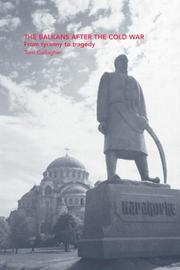
ISBN: 0415277639 Year: 2003 Publisher: London Routledge
Abstract | Keywords | Export | Availability | Bookmark
 Loading...
Loading...Choose an application
- Reference Manager
- EndNote
- RefWorks (Direct export to RefWorks)
Yugoslav War, 1991-1995. --- Yugoslav War, 1991-1995 --- 841 Politiek bestel --- 851 Burgeroorlogen --- 855.4 Militaire interventies --- 884.3 Zuid-Europa --- War in former Yugoslavia, 1991-1995 --- Yugoslav Conflict, 1991-1995 --- Yugoslav Wars of Secession, 1991-1995 --- Yugoslav War Crime Trials, Hague, Netherlands, 1994 --- -Former Yugoslav republics --- Yugoslavia --- Ex-Yugoslav republics --- Ex-Yugoslavia --- Former Yugoslavia --- History. --- History --- Former Yugoslav republics
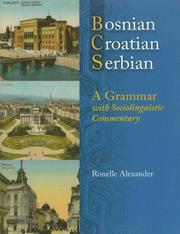
ISBN: 9786612269899 1282269895 0299211932 9780299211936 0299211940 9780299211943 9781282269897 Year: 2006 Publisher: Madison (Wis.) : University of Wisconsin Press,
Abstract | Keywords | Export | Availability | Bookmark
 Loading...
Loading...Choose an application
- Reference Manager
- EndNote
- RefWorks (Direct export to RefWorks)
'Bosnian, Croatian, Serbian, a Grammar' analyzes and clarifies the complex, dynamic language situation in the former Yugoslavia. Addressing squarely the issues connected with the splintering of Serbo-Croatian into component languages, this volume provides teachers and learners with practical solutions and highlights the differences among the languages as well as the communicative core that they all share. The first book to cover all three components of the post-Yugoslav linguistic environment, this reference manual features: Thorough presentation of the grammar common to Bosnian, Croatian, and Serbian, with explication of all the major differences Examples from a broad range of spoken language and literature New approaches to accent and clitic ordering, two of the most difficult points in BCS grammar Order of grammar presentation in chapters 1& 16 keyed to corresponding lessons in Bosnian, Croatian, Serbian, a Textbook "Sociolinguistic commentary" explicating the cultural and political context within which Bosnian, Croatian, and Serbian function and have been defined Separate indexes of the grammar and sociolinguistic commentary, and of all words discussed in both
Sociolinguistics --- Serbian language --- Croatian language --- Bosnian language --- Language and languages --- Language and society --- Society and language --- Sociology of language --- Language and culture --- Linguistics --- Sociology --- Integrational linguistics (Oxford school) --- Montenegrin language --- Slavic languages, Southern --- Serbo-Croatian language --- Bosniac language --- Bosniak language --- Grammar, Comparative --- Croatian. --- Bosnian. --- Serbian. --- Social aspects --- Sociological aspects --- Former Yugoslav republics --- Ex-Yugoslav republics --- Ex-Yugoslavia --- Former Yugoslavia --- Languages --- Political aspects.
| Listing 1 - 10 of 30 | << page >> |
Sort by
|

 Search
Search Feedback
Feedback About UniCat
About UniCat  Help
Help News
News